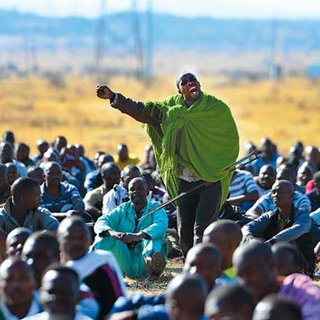This August, South Africa commemorates 12 years since the Marikana Massacre, widows, children and relatives, remember and mourn their loved ones who lost their lives on that fatal day, where 44 people were killed and 78 were injured during the strike.
The Forge, in partnership with the Socio-Economic Rights Institute of South Africa (SERI), held a commemorative event to commemorate and revive the collective call for ‘Justice for Marikana’.
Yvonne Phyllis who is a director at The Forge, welcomed all those present, amongst them were activists, researchers, unions, members of organisations, attorneys, community members and children. She spoke about how sad it is to organise such gatherings but emphasised that the discussions must take place for people to find justice and healing.
Nomzamo Zondo from SERI explained how they have been on the journey to bring justice, healing and peace to the families of the slain Marikana miners. She also emphasised that the life of a black person has always been treated cheaply and unworthy alluding to how the mines refused to balk to the mineworkers’ demands and instead chose murder as a short cut method to solve a problem.
Julian Brown, an Associate Professor in Political Studies at the University of the Witwatersrand and author of ‘Marikana: A People’s History’, was asked by the Panellist about the state’s response toward the matter, he said the state has done nothing sufficient, their response was just to emphasise that if the workers weren’t violent and fought with the police they wouldn’t have been killed and that the police were defending themselves. That was the lie, the state chose to blame the dead for their actions, overtime activists and communities stood up and challenged the state and there were attempts to hold people accountable and the state never fully engaged, Brown added.
Asenati Tukela, SERI attorney leading the case on behalf of the families, also shared his four years journey with the case of Marikana, he told the people about how painful, devastating and cheap migrant workers were taken by the mines and that the massacre brought a big distraction in the families and widows, forcing them to be leaders of their families and migrate to Marikana to find ways to live. The families continue to face many challenges such as lack of justice and acknowledgement, healing, psychological counselling and trauma support, Tukela added.
Koketso Moeti an Activist and Founding Executive Director of Amandla.mobi was asked about conditions of Marikana Town, she said absence of service delivery, poor infrastructure, living and working conditions remain present in every aspect in Marikana. Miners stood up for themselves and private sectors called the government, they were quick to respond because they priorities economic interests over human rights, explained Moeti.
Moeti shared that the state was criticised for their failures, lack of justice to criminal efforts and the state was asked to grant an apology, grief, emotional, parental care and loss of spouse support and those matters were not considered fully. He also shared some heart-wrenching incidents while engaging with the affected families, including the Monesa family, where the mother was rushed to the hospital upon hearing the news of her husband’s death during the strike. Tragically, she passed away later that day. Moeti and his team visited the mines to discuss support for the child’s education, the mining company placed the child in an elite school that would have been unaffordable even if the father were alive, sadly the child later took their own life due to severe bullying, added Moeti.
After the program director opened for comments and questions, one participant said that the state has all the money in the world to defend themselves with powerful lawyers. Musiwa Madika a researcher asked what distinguishes Marikana strike from other strikes.
Linda Dlamini also asked how they continue with the work they do without losing hope for so many years and how do they deal personally with such heart-breaking incidents especially when engaging with families.
Julian Brown explained that every protest is a threat, the police were forced and designed to respond in violence to maintain control during apartheid era and that has not changed, it still occurs during democracy, and they are prioritising enforcement over community peace. Brown further explained that everyone’s journey is different, but they are all united in one course to bring justice and Solidarity to the families and South Africa as a whole.
Responding to whether mainstream media are holding Lonmin accountable and whether the mine were taking any responsibility, Tukela responded saying the mine hasn’t come to the table in relation to the justice project, they have only established a trust fund that takes care for children of the deceased mineworkers. He said that is not justice to its full extent and it is up to them to realise what’s necessary and meaningful for those who died, and their families left behind.
According to the law practitioner, to prevent another Marikana, there is much to be done in relation to the police as a public service, we need government that speaks for us, the poor and the exploited.
We must evaluate whether the police are policing the right way, respecting human rights and show elements of Ubuntu.
In closing this discussion, there were performances by the band, Iphupho Lika Biko and poetry by Makhafula Vilakazi.
This article was submitted on 10 August 2024. You may republish this article, so long as you credit the authors and Karibu! Online (www.Karibu.org.za), and do not change the text. Please include a link back to the original article.


 Download PDF
Download PDF